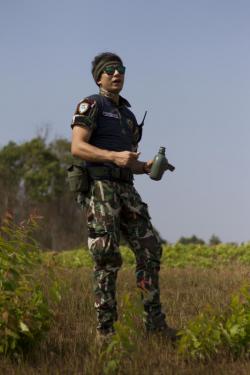People once approached wild animals with weapons. Now, they call for Mor Lot.

The celebrity vet, whose real name is Patarapol Maneeorn, has gained popularity through his one-of-a-kind ability to control elephants, from their movement to their temperament. For example, he has demonstrated the ability to direct elephants where to go with a basic hand gesture or verbal command.
All he has to do is look the animal directly and deliberately in the eye. Many people say that he can speak the language of animals after spending so much time immersed in nature. But Dr Patarapol says his secret comes down to experience and observation.
"I can't speak any animal language. All I did is learn their movement and interpret it," Dr Patarapol said. "Then, I went through my mind about what it means from my previous experience. Animals never attack humans unless they feel threatened by humans. So the first thing I do is gain their trust and read their next move."
In one recent case, he was alerted that a bear had run into a village, attacking anything and everything in front of it. A local hunter had slashed it with a machete moments before. Instead of killing it, Dr Patarapol instructed his team to calm the animal, tranquilise it and move it to a medical facility for treatment.
"I understand people don't know animal habits. They will just kill the animal in order to protect the human," Dr Patarapol said. "But don't forget the jungle is their home and humans invaded it. So the best way to deal with the problem for me is to keep them alive, then educate locals about what to do if they are in the same situation again."
ANIMAL WHISPERER

Tall and tanned, some of his fans believe Dr Patarapol is a professional actor or model. But as Thailand's first wildlife veterinarian for the Department of Natural Resources, Wildlife and Plant Conservation, Dr Patarapol splits his time between the wilderness and the city, where his main office is located. His special ability to communicate with wild animals, paired with his striking looks, has built him a strong social media presence.
Known on social media as Mor Lot, and considered by some the hottest vet in the country, he grabs public attention easily -- even when he is working in a remote jungle. His most heroic act, which he is most celebrated for, was taming a wild elephant that had overheated and was reacting violently. A picture on Mor Lot's social media account shows him leading the elephant away, just as the animal looks ready to unleash an attack.
Many of his missions are not easy. No one else can do what he does. But Mor Lot is trying to change that. He's teaching people to engage with animals in a different way.
NOT AN ANIMAL LOVER
With the type of work he does, people automatically consider him an animal lover. But Dr Patarapol says clearly that he is not -- he's just someone who is deeply passionate about what he's doing.
While he may play down his love for animals, the event that inspired his career was a deeply personal one which took place outside his childhood home in Surin. Dr Patarapol's family owned a Thai dog named Billy, a beloved member of the family. One day after school, 15-year-old Patarapol was walking home when Billy spotted him from the other side of the street. Billy was happy to see him arrive home and was poised to run across to greet him.
The young Patarapol was aware that if he stepped forward, the dog would certainly run to him. He saw a truck coming down the street, travelling at high speed, and he moved without thinking. Billy bolted and was hit by the truck. He was left howling in agony.
"I saw blood come out from his mouth and I knew he needed help," Dr Patarapol recelled. "I ran to a house on my street where I knew the owner was a veterinarian but he wasn't home at the time. I slowly watched him die and I felt very bad to see him in pain."
From that day onward, he was inspired to learn how to help all suffering animals. He became determined to be an animal caregiver.
COMBINED KNOWLEDGE
As a sports lover, Dr Patarapol was always fascinated by the human body's strength and possibilities. His interest in sports science was based on his experience as the high school basketball team captain. He led his team to victory in regional competitions and was chosen to be part of the national squad as a junior.

In high school, he was forced to choose between what he knew he was good at and what he was always passionate for as a child. He decided to study science in order to pursue animal care in university, while continuing to serve as his school's basketball team captain.
But as his studies progressed, he realised that studying was time-consuming, demanding too much of his energy. His grades began to worsen, as did his performance in basketball. He grew weary of the risks of a career as an athlete, given the scant opportunities at the time. He then made a decision to fully focus on finishing his education to become a veterinarian.
ELEPHANT DOCTOR
After graduating in 2002, Dr Patarapol returned to Surin, known as the "land of the elephant". He landed a job immediately as a doctor at an elephant conservation centre. His university education trained him to work with large animals. Due to the scarce number of experts in his field, Dr Patarapol was in demand. Word of him spread to Khao Yai, where park officials asked him to work with injured elephants on a case-by-case basis. In 2004, he was hired as a temporary staff member at Khao Yai National Park.
Both Dr Patarapol's parents were government officials, developing his desire to do similar work. He was also inspired by a love of His Majesty the King. He thought the best way to show his gratitude for His Majesty's work for the country was to serve the public through the government. While working at Khao Yai, he began studying for the exams to become a government official.
After passing his exams, he was appointed as the DNP's first wildlife veterinarian in 2007, having successfully justified the position as a key step in Thai conservation efforts.
GIVING BACK
After more than a decade of working with wild animals, Dr Patarapol declared he shouldn't be the only DNP veterinarian focused on conserving wildlife. He raised the issue with the DNP, asking them to recruit more veterinarians to cover the many neglected forest areas in Thailand.
Since his initial plea, Dr Patarapol has trained 40 new DNP veterinarians, with the numbers still growing. Still, he believes more could be done to tackle the remaining conservation challenges.
"Though we have 40 more veterinarians, it still doesn't cover everywhere in Thailand. Besides the new staff, I think it is better and far more important to train locals to know about animal habits. I also have inside intelligence from local hunters, who know their area much better than any of us," Dr Patarapol said.
He is now passing on his knowledge to local hunters, adopting them into the team's agenda. He explains to them that all animals play an important role in the ecological system. Each helps balance out different elements of nature necessary for survival.
He also teaches locals about the dangers of killing elephants for ivory. Elephants eat a type of plant that inhibits the growth of key local vegetation, including mushrooms. If you kill off elephants, you kill off local goods, which are a major source of income and sustenance.
"I think it is more sustainable to point out to them what they will gain and lose than simply being heavy-handed with the law. I believe many people have started to understand the harmony of the ecological system and understand that it is essential to conserve it," Dr Patarapol said.
Dr Patarapol is an award-winning veterinarian, the owner of a cabinet filled with trophies and certificates from his years of work. But recently, he says, he is turning many of them down. He does not want any more fame or the spotlight.
"I think there are people who have never received awards before and work just as hard or harder than me and deserve the award, as they contribute just as much. They deserve recognition to inspire them to do more.
"For me, the best award and prize I received is being a good son to my parents, as well as being a useful citizen of His Majesty the King. I will continue to do more to contribute to society."

Call of nature: Patarapol Maneeorn, the first wildlife vet for the Department of National Parks, has amassed a following on social media for his work.
